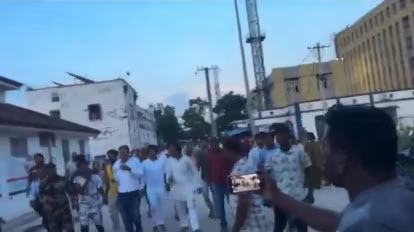Krishna Janm Bhumi Shahi Eidgah case:Allahabad High Court reserves verdict on Masjid Committee’s plea.
In the Krishna Janmbhoomi-Shahi Eidgah title dispute case of Mathura, the Allahabad High Court on Friday reserved its verdict on Masjid Committee’s plea challenging maintainability of 18 suits filed by Hindu side.
Today (on Friday), Justice Mayank Kumar Jain concluded the hearing and reserved its verdict on an application filed by Shahi Eidgah Masjid under order 7 Rule 11 of civil procedure code (CPC) challenging the maintainability of 18 suits filed concerning Mathura’s Sri Krishna Janmabhoomi-Shahi Idgah Masjid dispute. Justice Jain also heard the arguments raised by the Hindu plaintiffs.
All 18 suits contain a common prayer seeking the removal of the Shahi Idgah mosque from the 13.37-acre complex it shares with the Katra Keshav Dev temple in Mathura. The additional prayers include seeking possession of the Shahi Idgah premises and demolition of the present structure.
Before the court, the counsel for Committee of Management Trust Shahi Masjid Idgah (Mathura), Tasneem Ahmadi primarily argued that the suits pending before the high court are barred by the Places of Worship Act 1991, which prohibits conversion of any place of worship and provide for maintenance of the religious character of any place of worship as existed on August 15, 1947. According to her, the suits also admit the fact that the mosque in question was built in 1669-70.
Besides, she contended that the prayer in the suits show structure of masjid is there and committee of management is in possession of the same. “In this way a question/dispute has been raised on Waqf property and thus provisions of Waqf Act will apply and in such it is the waqf tribunal who has jurisdiction to hear the matter and not a civil court”, she added.
During the course of hearing, the counsel representing Hindu side, Vishnu Shanker Jain had submitted that the compromise dated 1968 between Shahi-Eidgah mosque committee and Hindu side was not signed by all the members of the trust or the plaintiffs to the suit but only three persons have signed it. Hence, it is not a valid one.
In reply to the same, the counsel for the UP Sunnii Central Waqf Board, Afzal Ahmad said that only those persons authorised by the trustees through the resolution passed in the meeting of trustees have put their signatures on the said compromise by which the Waqf board has vacated its land and after evicting its about 40 tenants and licensees , the Waqf Board has given the land to the temple. Hence, the said compromise of 1968 between Eidgah and Hindu side is a valid one, which was affirmed by the court in 1974. Further, no suit can be filed after such a long time as the limitation to challenge a compromise is three years but suits have been filed in 2020 and thus present suit is barred by limitation Act.
The Hindu plaintiffs had also taken the plea that no property in the name of Shahi Idgah is in the government records, and the same is occupied illegally. It was also said that if the said property is a Waqf property, then the Waqf Board should tell who donated the disputed property. It was also argued that the Acts of Worship Act, Limitation Act, and Waqf Act are not applicable in this case.
In May last year, the Allahabad High Court transferred to itself all the suits pending before the Mathura court praying for various reliefs pertaining to the Krishna Janmabhoomi-Shahi Eidgah Mosque dispute, allowing the transfer application filed by Bhagwan Shrikrishna Virajman and seven others.




